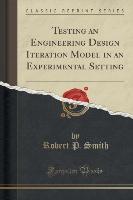Testing an Engineering Design Iteration Model in an Experimental Setting (Classic Reprint)
BücherAngebote / Angebote:
Excerpt from Testing an Engineering Design Iteration Model in an Experimental Setting
Abstract
In this paper, we compare two alternative design strategies for the Delta Design Game, an engineering design exercise. We first analyze these strategies using the Work Transformation Matrix, a design iteration model which shows that one of the strategies is expected to display a faster solution time. We then demonstrate experimentally the difference in development time by observing eight design teams working on the problem using the two strategies. We found that the "decoupling strategy" suggested by the model reduced solution time while maintaining quality of the technical solutions.
1. Introduction
Design performance is an important factor in determining the success of a manufacturing firm. The amount of time that it takes the firm to develop a product is an important factor in determining the success of the design [Clark and Fujimoto 1991].
Our study of the design process has led to the development of formal mathematical models of the design process which can estimate the amount of time that it takes to design a technical product [Eppinger et al. 1990, Eppinger et al. 1992, Smith and Eppinger 1991a, Smith and Eppinger 1991b]. We have applied one of the models (the Work Transformation Model, described in the next section) to some industrial design environments (Smith and Eppinger 1991b), which have shown reasonable correlation with our model. While we are encouraged by the analytical results of these design iteration models, we have found, however, that actual design environments are difficult to observe directly. One must rely on the retrospective description of the design process from the individuals involved.
We have designed the research experiment presented here in order to verify the ability of the Work Transformation Model (WTM) to predict important differences in the performance of alternative design strategies. The experimental design environment is small enough so that we can observe and control it directly. We will show that: (1) the model is able to suggest a successful decoupling strategy which is not obvious to the design engineers, and (2) the model is able to identify critical technical issues which drive iteration time.
About the Publisher
Forgotten Books publishes hundreds of thousands of rare and classic books. Find more at www.forgottenbooks.com
This book is a reproduction of an important historical work. Forgotten Books uses state-of-the-art technology to digitally reconstruct the work, preserving the original format whilst repairing imperfections present in the aged copy. In rare cases, an imperfection in the original, such as a blemish or missing page, may be replicated in our edition. We do, however, repair the vast majority of imperfections successfully, any imperfections that remain are intentionally left to preserve the state of such historical works.
Folgt in ca. 5 Arbeitstagen
